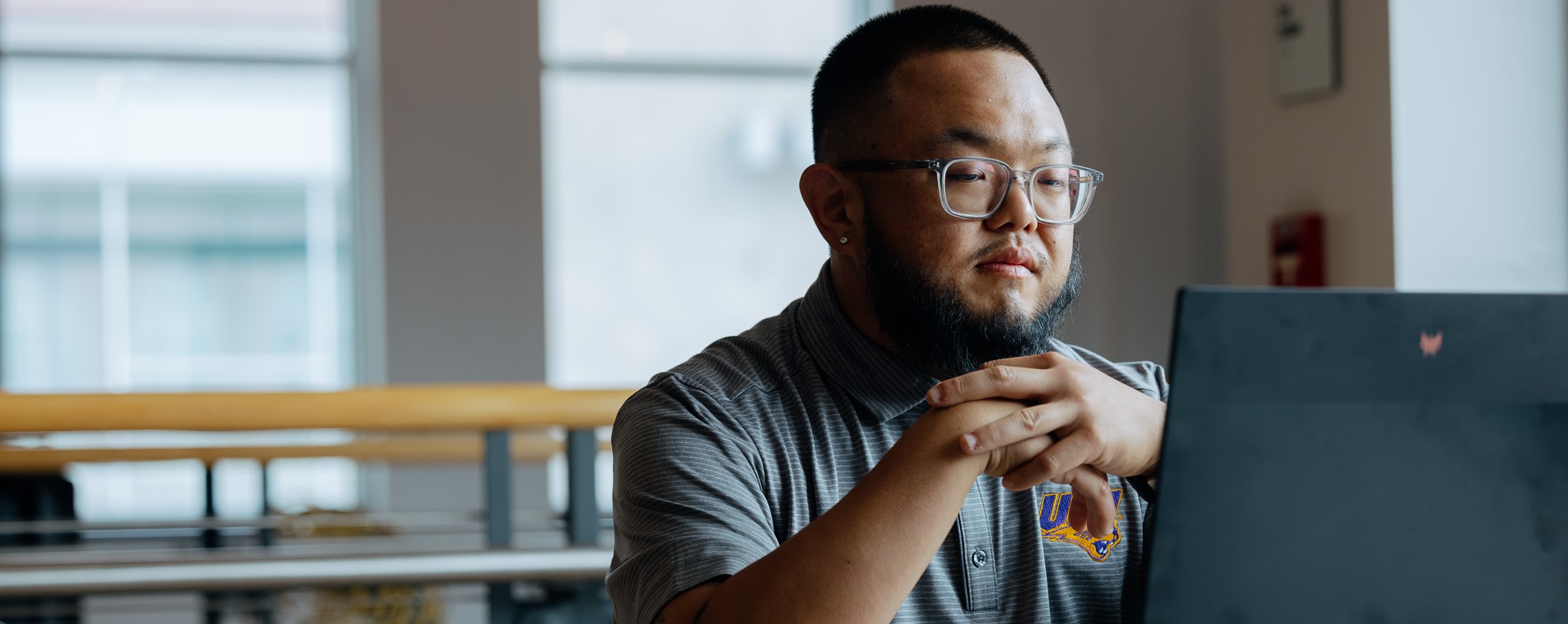Advancing your career, online
A principalship perspective
This summer, five UNI principalship candidates in two cohorts (Purple and Gold) participated in the filming of a video focused on the principalship program. Here is the fuller story of what they had to share about what it is like working toward their master’s in education or principalship advanced studies certificate in these primarily online programs.
Joining in the conversation were:
- Levi Miller, (LM), business and computer science teacher and baseball coach, Nashua-Plainfield School District
- Molly Dabroski (MD), literacy consultant, Grant Wood AEA
- Tim Hopper (TH), 7th grade social studies teacher and athletic advisor, Waterloo School District
- Andrew Kim (AK), special programs teacher, Dubuque School District
- Kelly Moeller (KM), school counselor, Cedar Falls School District. .
Life as a principalship candidate: Q& A
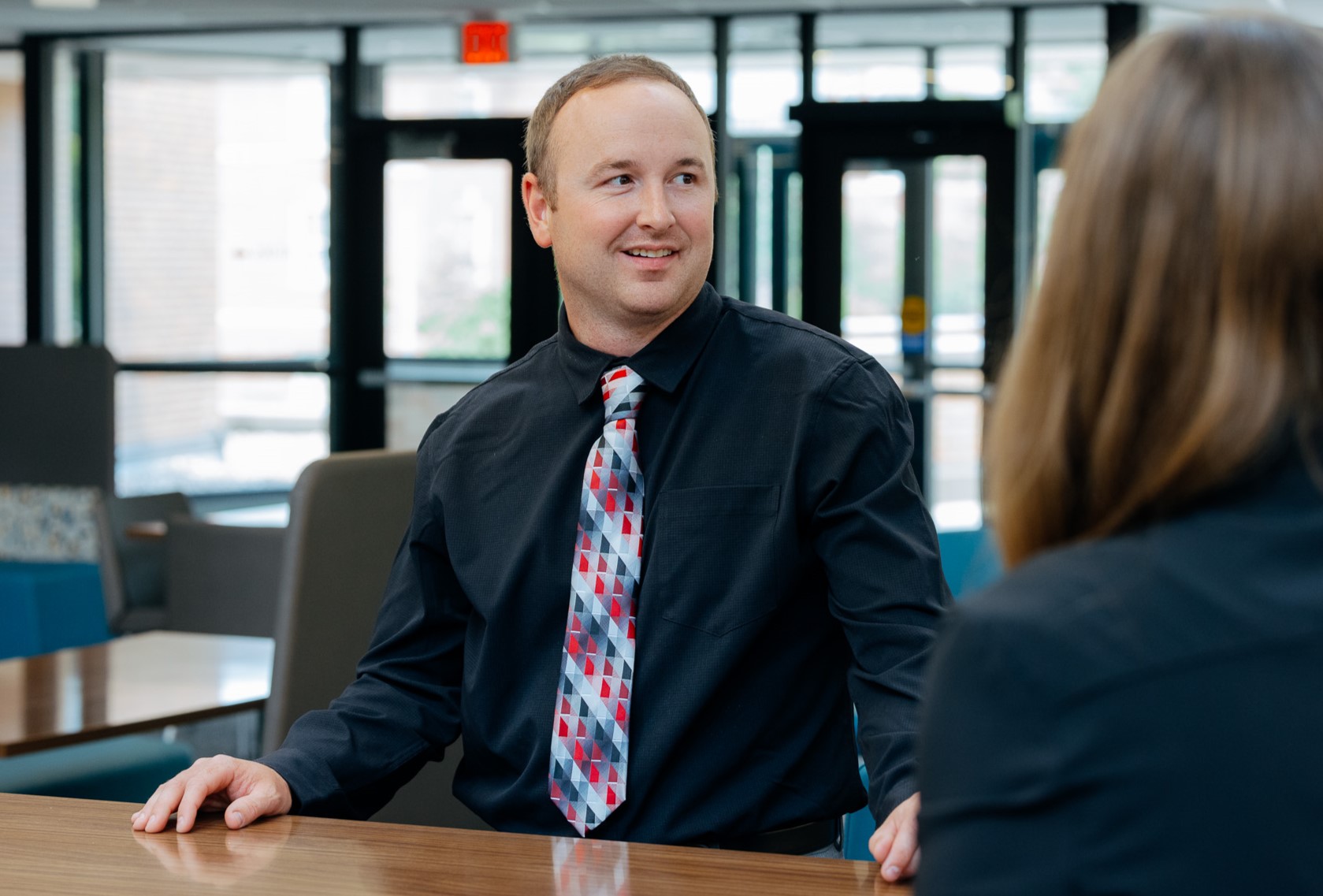
What led you to seek a principalship degree? And why UNI? What made this degree program attractive to you?
LM: I think it was just time. After 10 years of teaching in the profession, I felt a call to the next step. There’s the track record of UNI and its reputation throughout the state. I grew up in central Iowa, did my undergrad in northwest Iowa, and word spreads quickly that UNI is an education college.
MD: I'm a UNI undergrad, so obviously, there was no question on where I was going to go, but last year I had several people kind of nudge me, like, “Why aren't you a principal?” I had a lot of people believing in me and that empowered me to go back to school. I'm a little bit later in life and I just decided to take the challenge. I'm so happy I did.
TH: I was led into the principalship cohort because all students can benefit from a teacher of color. I wanted to extend my reach. And UNI was just right in my backyard.
AK: When I was first looking, I wasn't looking for a specific program or anything. I just knew that I wanted a master's degree and I needed to get a master's degree. And a lot of people recommended UNI. They really liked the program, the flexibility of being online and having the ability to work from home. So I looked at all those factors and it just fit into my schedule really well.
KM: I would consider myself a lifelong learner, and I am always looking at ways to better myself. I love challenges, and it seemed that leadership classes would be the next step, so that way I can better serve my students and the teams that I work with at school. After speaking with two professors here, the communication was super fast, they were very prompt, very detailed, very passionate about the program. It just seemed like a very good fit.
Have you experienced an online degree program before? What has surprised you?
LM: I did not experience anything online before this. I didn't know what to expect, but it was a very seamless transition from having no experience learning online to learning online a lot. And the professors, the support staff make you feel very comfortable asking questions.
I’ve got two little girls, Brinley and Blake. Brinley is two and a half. Blake is about to be a year old. And then teaching and coaching… Like any adult with a family, you have a lot of responsibilities. And with the support of my wife, I really haven't had any problem keeping up. (The faculty and staff) work with you to give you assignments, projects and learning experiences that actually matter.
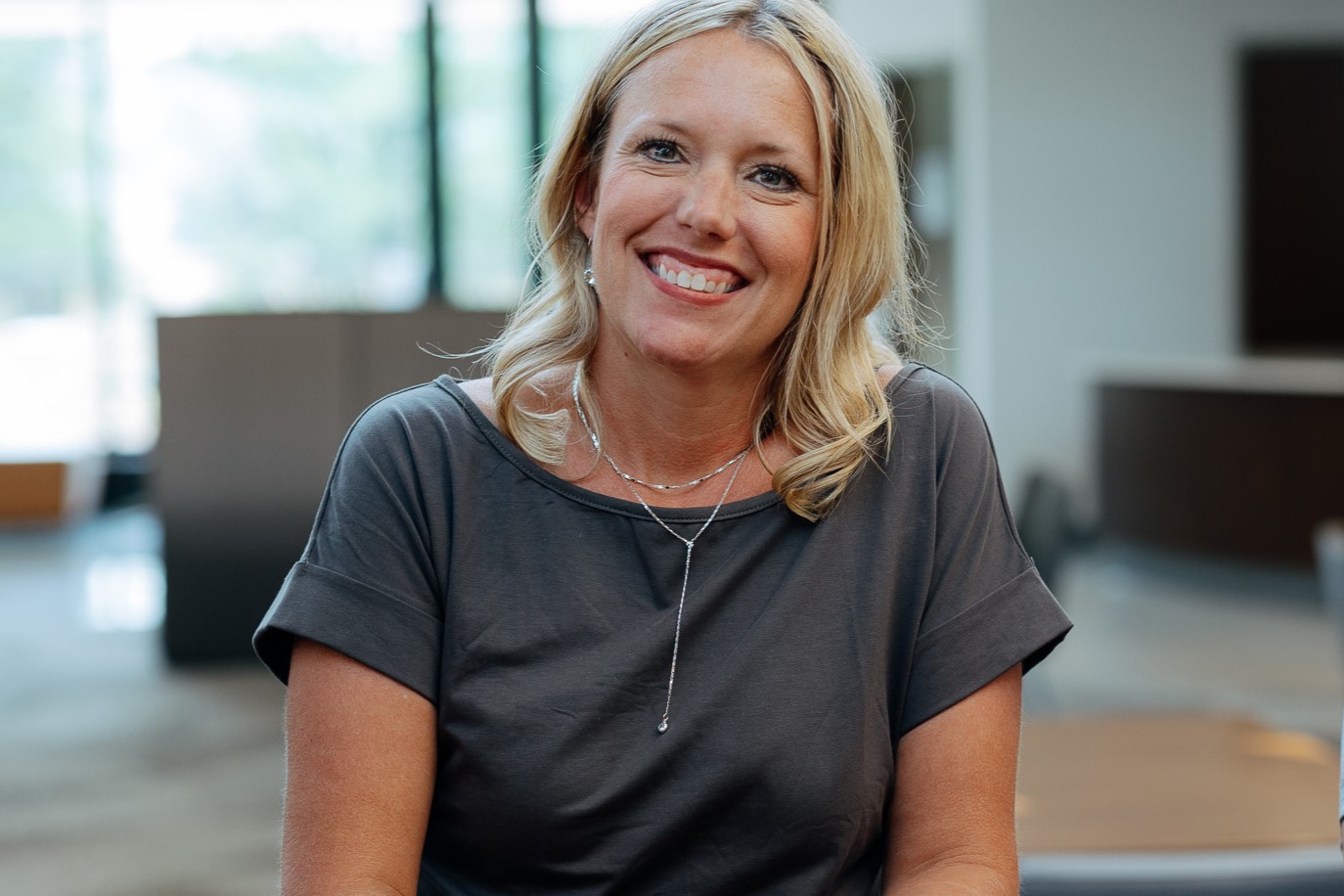
MD: I've only taken a few online classes here and there just for research credit, but never a full program. What surprised me is how manageable it was. I was kind of nervous. I didn't know what to expect. But the professors and the materials are all easily accessible. It's been a wonderful experience so far.
It's the only way really for me. I have two daughters, 15 and 12, and it's just the three of us in our home. So they're busy running around and doing their thing. It was nice to be home and have class and still have a pulse on what was going on at home.
TH: The distance education model works with my home life balance by having class one night a week. I always look forward to the Monday nights where I have class. I can schedule this with my wife and kids and say, hey, this is my time to do what I need to do. And then the rest of the weekend, just take care of my family.
AK: The one thing that surprised me was how quickly you build a connection over.an online platform with your professors, with your fellow peers and classmates, and how interactive some of the classes really are, even though you're several miles away from them.
At first it was very difficult, just figuring out when I have to log in, what needs to be done, but once you get organized and you understand the schedule, and you keep on top of your assignments, it becomes very routine.
KM: So I've taken online classes before–quite a few–but I have never had a continuous program per se. I have a very busy home life schedule. I have three small children. I work full time and I actually have a business outside of the school that I own. (The online program) actually fits in really well.
What’s a typical week like for you as an online student?
LM: My classes are on Monday nights, typically from 6 to 9. Every single Monday. Then you kind of have your outlook for the rest of the week, kind of your checklist, right? What needs to get done, your readings, and then you're prepared for class that following Monday. And it's just kind of that, rinse and repeat. I wouldn't say that it's an overwhelming workload because they understand that these are people that are leading adult lives, have families, but they also push you in a way that is going to further your education to prepare you for that leadership role.
MD: I have class on Wednesdays from 6 to 9. We would sometimes have meetings with our group throughout the week if we had a presentation, but there would be readings outside of that, maybe some papers to write, interviews with other colleagues, and then some internship experience also. It has been very manageable, and the professors have been amazing to work with.
TH: I have classes on Monday nights, and the rest of the week, after I get done teaching, I get to go home, I enjoy my kids, enjoy my wife, enjoy myself. Of course there are papers and projects that I have to do, but I can always fit them in periodically throughout the week. So it's been a really good model for us.
AK: Depending on which part of the year you catch me, it would be work, coaching, coming home, trying to spend a little time with my family as I can. And then logging on to class time. But any other time, it's trying to just find the balance of when to do the classwork. You still find the time to do the things that are part of your life, like your family.
KM: We consistently meet on Monday nights for Zoom. I stay after school until the 6 p.m. Zoom. That gives me an hour and a half to wrap up any homework and get a look at what’s expected for the week and get a jumpstart. I do the Zoom in my office and then I go home. Over the course of the next week in the evening after the kids go to bed, I do some reading.
It's not too heavy of a load, you can get it done if you chip at it a half an hour each evening. It's not too much work, but enough to really give you a great experience.
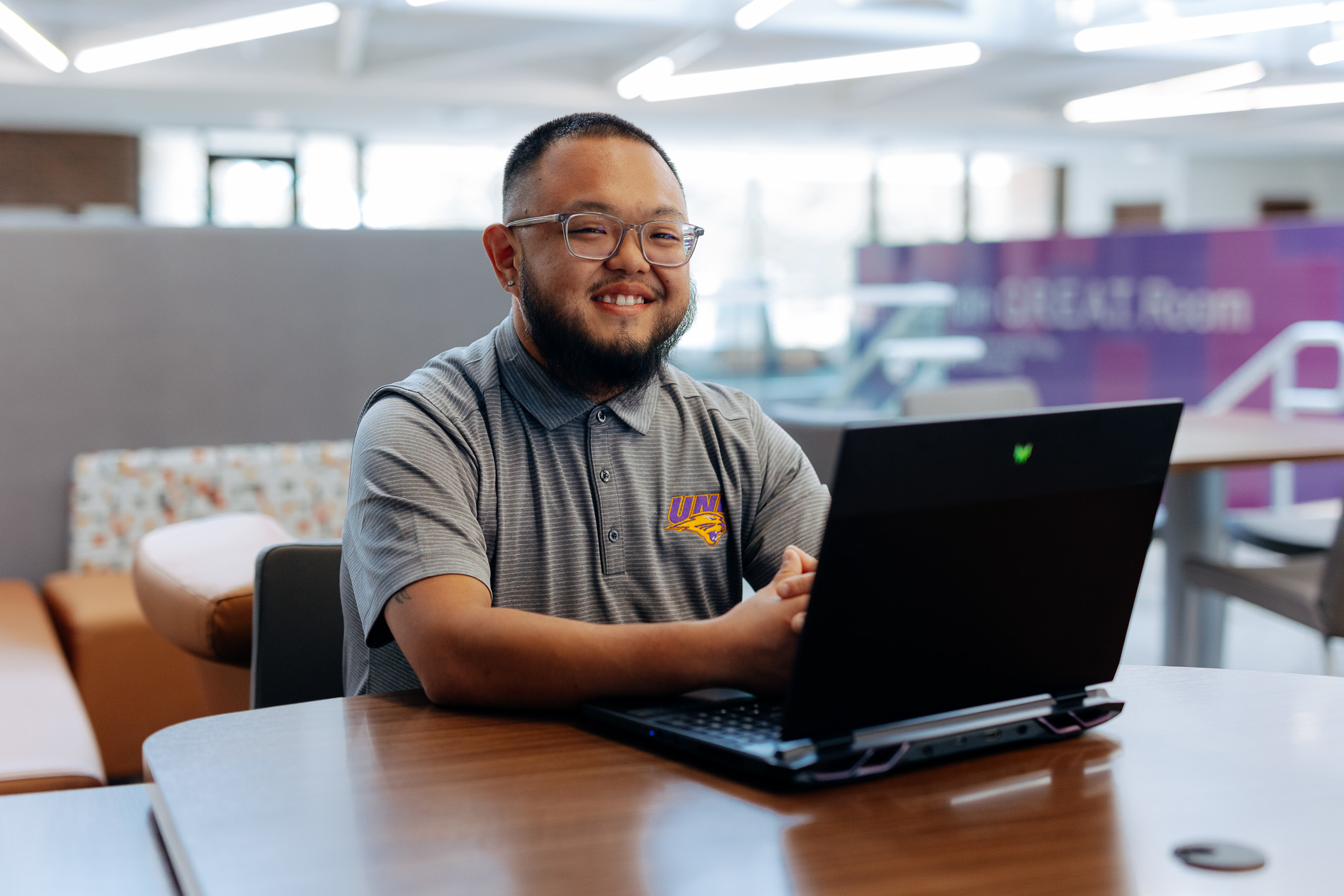
How have you felt supported as you work to complete this program?
LM: I'm a head baseball coach in the middle of our season. I brought up that concern last year during orientation. They have been very flexible with me, still holding me accountable by all means. They say, “Hey, we're going to work with you to make sure that we're going to get you through this in the right way.”
During zoom class, Brinley runs up to me and wants to see everybody on camera. All I see back from the professors and the classmates are smiles. That's just a sign of the welcoming environment that they've established for the program.
TH: A family member recently passed away, and Dr. Theo, Dr. Townsley, Dr. Hayes all reached out to me. Asking me how I was doing, was I okay and how they could help out and gave me their sincere condolences.
AK: The professors here are awesome, very communicative, not hesitant to help you out at all. As far as your peers go, I have people within my school district that are doing the program with me. But I feel like even if I didn't have peers from the same city, I would still get the help and support I needed from the other peers in different cities and across the program.
KM: They are so dedicated to their jobs, and they're very detail oriented, and they're very quick with their responses. And if they're not sure, they will look for resources for you. I've even had experiences where I've had some questions and the professor says, “Hey, let's zoom this week and talk about this so we can get this hashed out and make sure you have clarity.”
How have you felt connected with your cohort and UNI, since you’re primarily online?
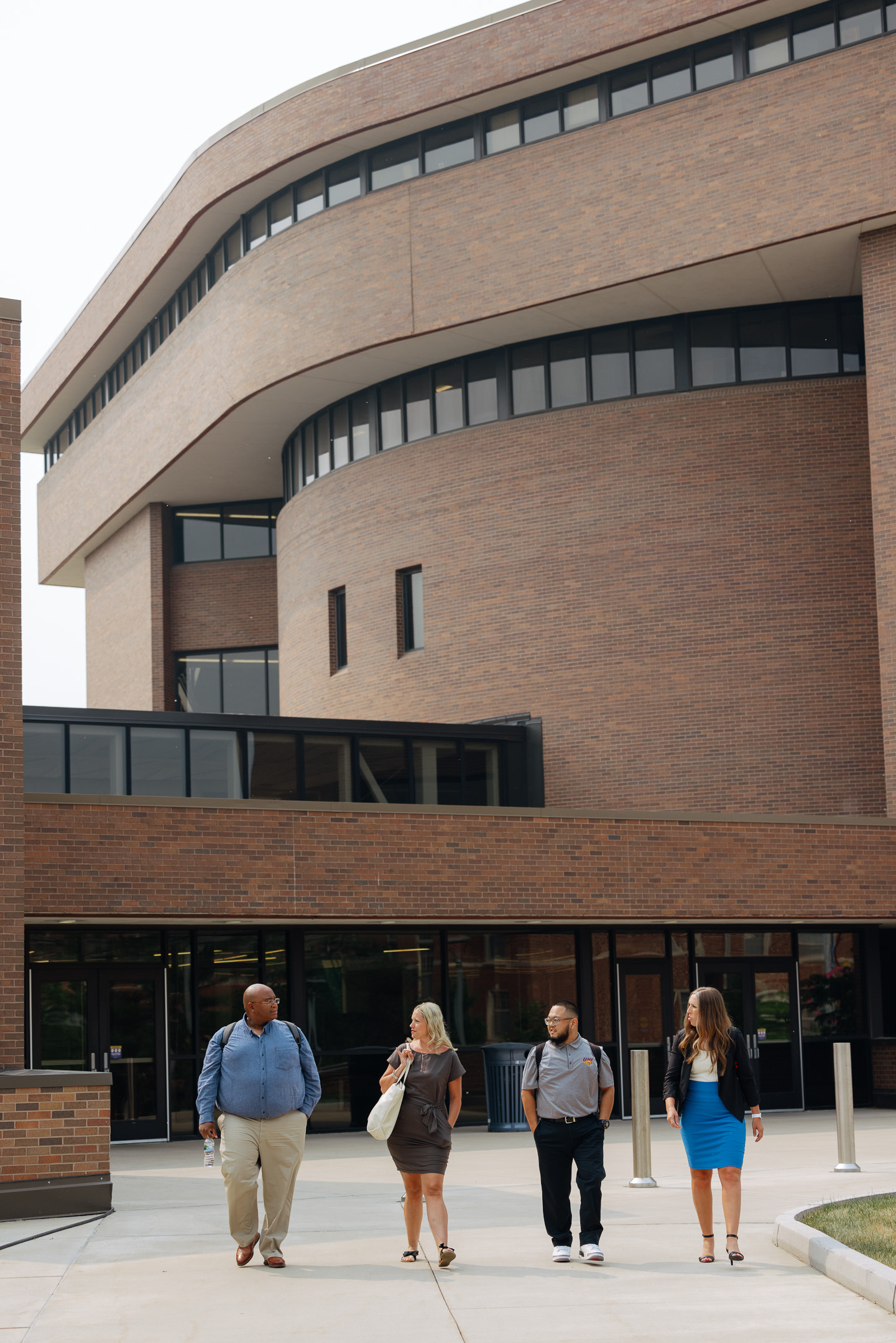 LM: At our first orientation activity, we were throwing a tennis ball around, learning each other's names. Now we've finally come back almost a year later, and we're on campus again, and you just feel connected. It’s “Hey, Tim,” “Hey, Laura…” Even though it's primarily through Zoom, and we have people in Cedar Rapids, Iowa City, all over, you still feel connected because of the personal bond that you've created through the cohort.
LM: At our first orientation activity, we were throwing a tennis ball around, learning each other's names. Now we've finally come back almost a year later, and we're on campus again, and you just feel connected. It’s “Hey, Tim,” “Hey, Laura…” Even though it's primarily through Zoom, and we have people in Cedar Rapids, Iowa City, all over, you still feel connected because of the personal bond that you've created through the cohort.
MD: We see each other on zoom all year long. When we got here the other day for the first on campus, it was like a little reunion. We actually only met each other one other time a year ago, face to face. So it's amazing how you can still connect with people online and just.
We'd go in breakout rooms throughout, and then just having group presentations and partners throughout the assignments does help with that connecting, too.
TH: So I felt connected with my cohort. And so we see each other as a lot of camaraderie that's going on and man, it's just been an awesome time. Wow.
There's a group of us that are specific here to the area, Waterloo, Cedar Falls, and so sometimes we can either meet after school or during the week. Here on campus, we've all just got together. It was great to put a face to what's happening there online.
AK: Even though primarily online, you still get connected through that weekly meeting. And some of the projects and assignments that we have to do require us to work in smaller groups. That helps build that bond and relationship, knowing that we're going to work towards a common goal.
KM: The classes have made it pretty easy to get connected. There are group projects. Even though it's online, during class, they'll put us in breakout sessions. So you're working with a smaller number of classmates. And then we also have some group text message communication outside of class. Then the program provides us with two weeks on campus where we're face-to face-for both summers of the program.
Describe your relationship with your professors.
LM: The professors want to establish a relationship and they have such an authenticity because they have been in the profession. You cannot argue with experience, especially with the staff that they have accumulated here – renowned names, published authors, people that have a reputation in all different parts of Iowa, being a premier former academic principal or superintendent.
And when you're coming and learning from those renowned names, you know that you're going to get something that is incredibly high quality.
MD: I've had a lot of great professors when I was in my undergrad, and then obviously this program, too. They've always been responsive. They've pointed out strengths that I have. They ask lots of reflective questions that really helped me learn about myself. And I would say that's one of the biggest things I've learned. They have helped me dig into who I am as a person and as a leader. And I appreciate that.
KM: They definitely have motivated me. I think their passion has radiated on us, which makes us excited for the profession. Some of us probably went into this not sure if being a principal is really what we want to do with our leadership or principalship certificate. They make it sound so awesome, that it's such an opportunity to be able to serve students and other adults. They’re very motivating, but yet they're also upfront and honest.
What are the highlights and benefits of the two weeks on campus in the summer?
LM: The highlight happened today…the day in the office activity, throwing real life scenarios at you, not knowing what's going to come walking through the door.
That's part of being a principal. You’re going to have real life scenarios thrown at you and you have to be able to think on your feet. I've talked about authentic learning–you can't get more authentic than that. I love learning when it's something tangible and you're going to use this.
MD: These days are by far the best. I mean, the online version of the program is great for managing work and home, but these days are very meaningful and authentic and genuine. They bring in lots of speakers and administrators from around the state. I've really enjoyed networking with them and learning from them.
TH: We not only work with educators, but people that are in the AEA. We also get to meet our professors and put that face to that picture that's on the screen that you see every Monday night. So it's just been an awesome time being here on campus.
AK: The benefits are finally meeting professors and your cohort face-to-face. Me, personally, I'm a huge face-to-face guy. This just brings our cohort and our bond with our teachers, professors, and our cohort that much closer.
The highlight would have to be the day in the office. The scenario day where you get a couple minutes to run through a scenario. I think that in-person, fast-paced quick real life experiences from all these different leaders across Iowa was and is the greatest experience.
KM: I think they really prepare their leaders for what reality will hold once you finally settle with that job that you want. We've had a lot of guest speakers who have come and shared information…this is a free opportunity for us to get a wealth of knowledge in a short amount of time.
And it's the opportunity to have side conversations with the professors or classmates on experiences. You're able to have real conversations and get to know people on a more personal level. And those stories that they share are priceless.
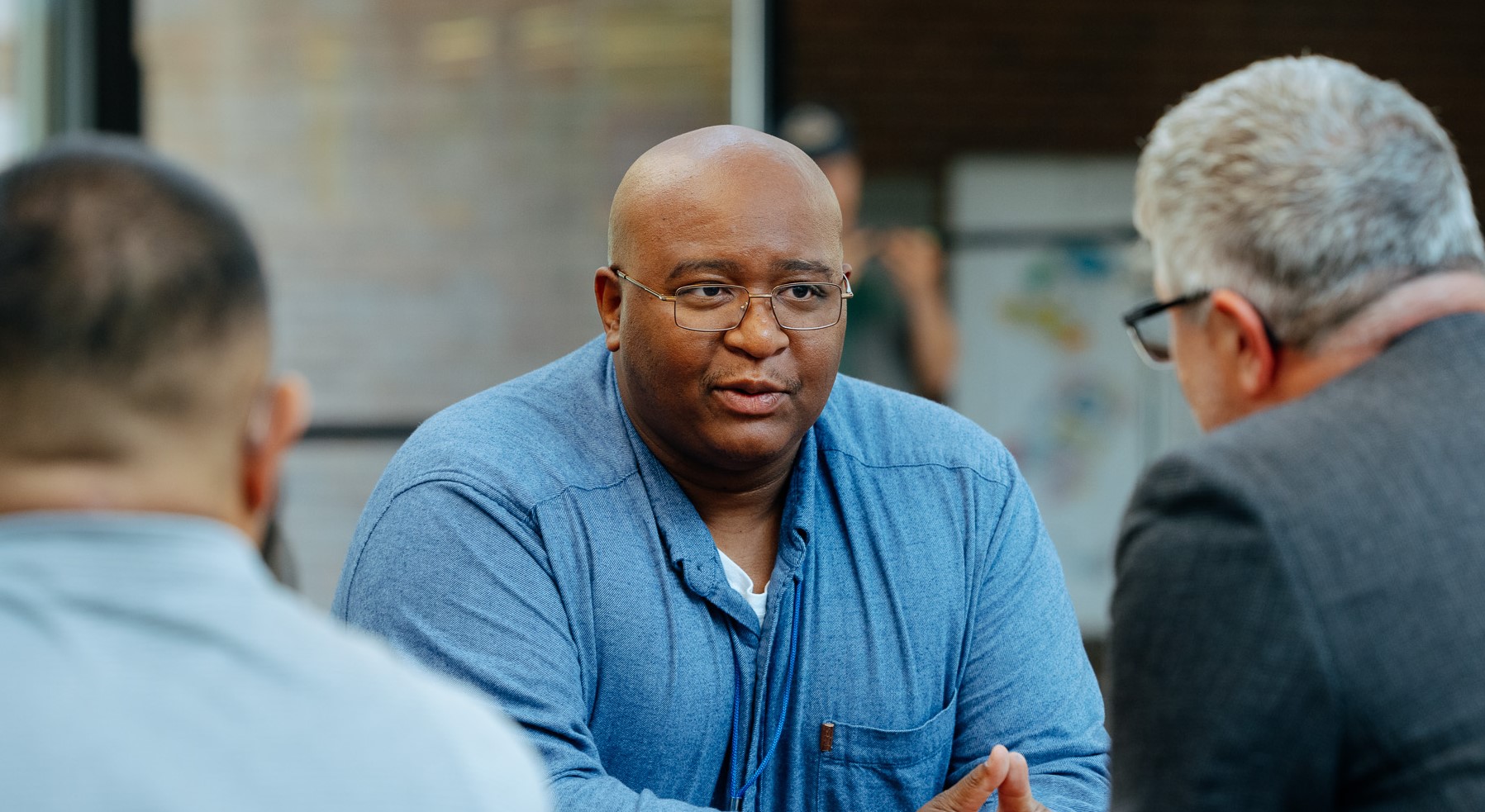
What would you tell others about getting an online education at UNI?
LM: It has all been things that I'm going to be able to use in the future as a principal. They're going to work with you. They're going to push you and challenge you in a way that. you weren't, you're not used to yet and that's okay. You know you're going to get challenged here to grow, to learn new things, to become the leader that you need to be. So again, it's just the good challenges that they face you with every day. And giving me flexibility to take that next step as a leader.
MD: I've connected with multiple people–the program casts a wide net among educators in the state. I would highly recommend it, especially if it's one of the educational leadership programs because the professors are top of the line and they work hard to make sure that you're getting the best out of the program. They will push you and ask you questions that really make you dig into what you want out of the program and the goals for yourself.
TH: I was a non-traditional student and I preferred to be in front of the classroom, so I can be personal with my professor and with my peers. But it actually hasn't been that bad. I have enjoyed having the freedom to be at home or wherever the internet is to access my classes online. I can work with my cohort and I can work with my peers across the state or across the region, wherever they are. I would tell other people, go after it.
AK: I would say that if you're hesitant about the online experience at UNI, don't be. They're going to be super supportive. They're going to help you out in whatever you need. They're super accommodating and it's just a great program overall. Earning this degree will definitely help with different opportunities that are available.
KM: I actually have a master's degree in a different area, and that was done completely in person. I don't think that either education is better than the other. I don't think I learned anything more in depth because I was in person. If anything, (learning online) helps you stay a bit more in tune to what you need to learn because your face is on the screen and everybody can see what you're doing. There's just different expectations. Learning online is an effective and efficient way to advance your learning and it also is cost-effective.
How do you expect earning this degree will impact your career?
LM: I love my current job and my current role right now. I love the school district I'm at, but I've felt a calling towards a leadership position. I know that earning this degree is going to give me that flexibility to be able to pursue that once I see an opening that is right for me.
MD: I plan to be a principal or some sort of an administrator. I have maybe 15 years left in education and I want to make a difference in children and in staff. I know that I can bring my core values that (this program) really helps you expand on into the principal job that I would obtain.
TH: I expect that earning this degree is going to impact me by ultimately getting in some leadership position here within the district or outside of the district, wherever a position opens up for me.
AK: It will open different doors. I realized that the program really helps you make those connections early on with all sorts of leaders across Iowa even before you graduate. That and being able to get that degree opens a lot of doors for you.
KM: Whether or not I decide to utilize my principalship certificate or not, the classes on leadership have already helped me grow into a better counselor. I feel more confident in working with other adult leaders in the building and sharing some of my ideas. I feel better about being able to handle more responsibility. It also has given me a different perspective of how schools function, the roles of the leaders within the school, how to work with other colleagues. Really, the main focus is student achievement. These classes have brought some valuable information and knowledge so that way we can better serve our youth.
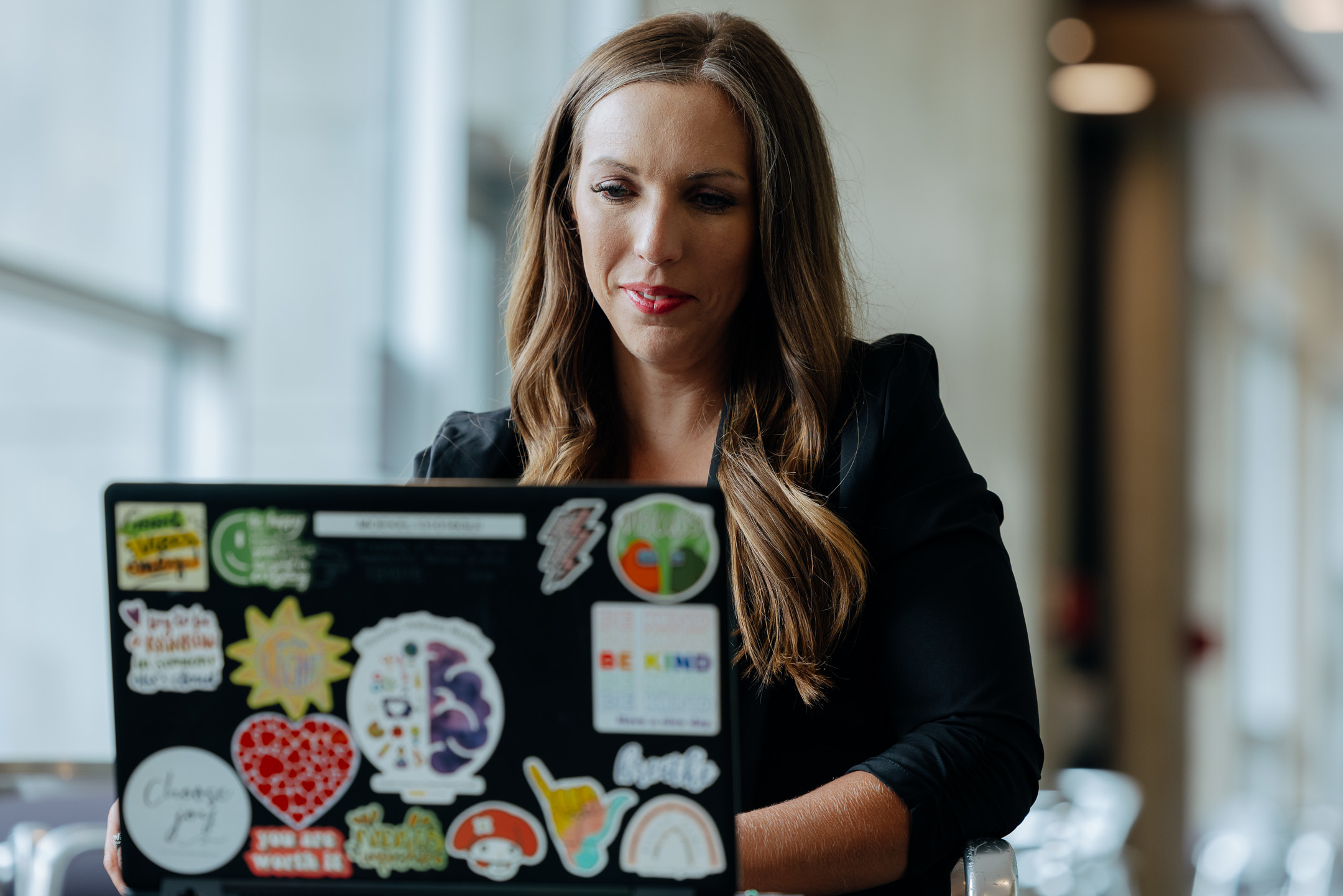
What do you look forward to most after you’ve completed this degree?
LM: I look forward to looking at things through a different lens. You're educated for a degree as a principal, and you're trained as a principal. And looking at things through that scope, even if I'm still a teacher for a couple years, is still going to make me better at what I do in education as a lifelong educator in the state of Iowa.
MD: I want to be one of the people that comes back to speak to the cohorts on these three days. I just really look up to (the speakers) and I think they have a high, high respect among the professors here. I hope to be one of those people to help others.
TH: I look forward to giving back to my community. The reason why I went into leadership was so that I could extend my reach. I love my community, I love Waterloo, and I love just being a positive influence on the youth that are in our city.
AK: I look forward to celebrating with my family and friends. That support system that helped me throughout this whole thing. Without them, I wouldn't be where I'm at. So, celebrating with them and honestly just seeing what the next chapter of life has for me.
KM: Just having opportunities. It’s something that I can utilize if I want to, but it's not something that I have to use. I love my job, and this has helped me be better at my job. But also, if an opportunity comes up that seems like the perfect fit or is within the district that I'm currently working at, I don't have to move or relocate my family. I'm prepared.

